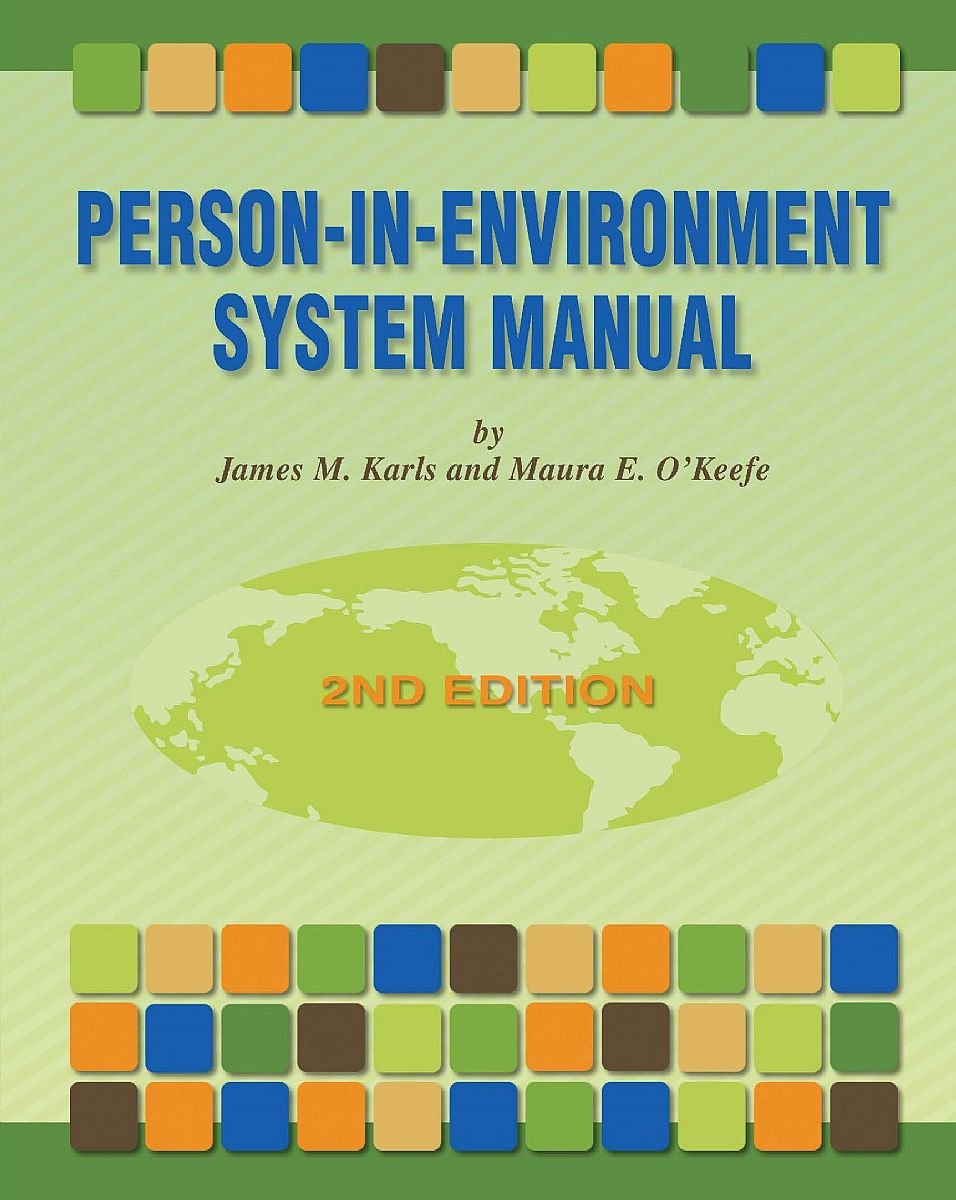
Person-in-Environment System Manual, 2nd Edition
Authors: James M. Karls and Maura O'Keefe
Page Count: 112
ISBN: 978-0-87101-379-8
Published: 2008
Item Number: 3798
$39.99
PIE was developed as an alternative to the commonly used disease and moral models (e.g. Diagnostic and Statistical Manual of Mental Disorders (DSM), International Statistical Classification of Diseases and Related Health Problems (ICD), Civil or Penal Codes) to implement social work philosophy and area of expertise. PIE is client-centered rather than agency-centered. Additionally, PIE was developed for use in all areas of social work practice (medical, psychiatric, family service, public welfare, private practice, etc.) to facilitate communication across practice specialty areas.
The PIE System is field-tested and employs the following structure: social role functioning, the environment, mental health, and physical health. This manual is useful for academicians, administrators, practitioners, researchers, and students regardless of the theories of human behavior they use.
Special Features
- Provides domain clarity for social workers and others in the helping profession
- Contains copyright free assessment forms
- Includes case examples of comprehensive holistic assessments
- Accompanies the CompuPIE software, an interactive, multi-media information management tool
Foreword
James M. Karls and Maura E. O’Keefe
Foreword
James J. Kelly
Foreword
Sue Dworak-Peck
Introduction
Chapter 1: The PIE System
Chapter 2: How to Use PIE in Practice
Chapter 3: Factor I: Social Role and Relationship Functioning
Chapter 4: Factor II: Person in Environment – Problems in The Environment
Chapter 5: Factor III: Mental Health Condition and Factor IV: Physical Health Conditions
Chapter 6: Severity, Duration, Coping, and Strengths Indexes
Chapter 7: Intervention Plan
Chapter 8: Instructions For Recording Case Findings Using CompuPIE and the PIE Worksheet
Chapter 9: Case Examples Using PIE
Appendices
1. Person-IN-Environment (CompuPIE) System CD Installation Instructions
2. List of Interventions
3. Numerical Coding
4. Factor III Mental Health Conditions
5. Factor IV Physical Health Conditions
6. Frequently Asked Questions
7. PIE in Other Languages
8. PIE Assessments Using the PIE Worksheet and Using CompuPIE
James M. Karls, PhD, LCSW, received a master’s degree in social work at the University of Chicago and a doctorate from the University of Southern California. Over the past 59 years, Dr. Karls had an extensive career as a clinician, administrator, and teacher in social work. He started the first mental health clinic in California’s Central Valley and directed mental health programs in California.
He held numerous appointed and elected offices within NASW, including the presidency of the California Chapter. Dr. Karls served on the national NASW Health/Mental Health Commission and served as chair of the NASW Task Force on Standards for Case Management and the NASW Certification and Accreditation Commission.
One of Dr. Karls’ key contributions to social work is his development of the “person-in-environment” (PIE) assessment system that attends more thoroughly to the biopsychosocial functioning than does the DSM. The first edition of the Person-in-Environment System, published by NASW Press has been translated in more than eight languages. Dr. Karls traveled extensively around the world teaching international social workers about the PIE assessment system.
Dr Karls received many awards for his contribution to the profession including NASW’s Chapter and Unit Lifetime Achievement award. He was also honored by the NASW Foundation as a pioneer in recognition of exceptional contribution to the social work profession. In 2001 he received a Lifetime Achievement Award from the National Council for Community Behavioral Healthcare.
Dr. Karls founded the California Hall of Distinction that honors past and present great social workers in California and was himself inducted in 2008. The National Association of Social Workers Foundation honored Dr. Karls with the 2008 International Rhoda G. Sarnat Award.
James Karls died on June 29, 2008.
Maura E . O’Keefe, PhD, is an associate professor at California State University, Sacramento. Prior to this time she was a tenured associate professor at the University of Southern California, School of Social Work. Professor O’Keefe teaches advanced social work practice as well as human behavior and family violence. She has been a licensed clinical practitioner for more than 30 years and has worked with diverse populations in both urban and rural areas such as Brooklyn, New York; rural Maine; and the hill country of Texas. Dr. O’Keefe has worked in different capacities and settings, including community mental health centers, medical and psychiatric facilities, substance abuse programs, foster care and adoption services, as well as services for battered women and their children. She has a private psychotherapy practice in California.
Dr. O’Keefe has published numerous articles on family violence and has appeared as a consultant for on various television networks, including CNN. She has conducted research on child abuse and neglect, dating violence, battered women and their children, posttraumatic stress disorders, women and substance abuse, and the effects of exposure to family violence on children’s adjustment. Additionally, she has conducted research evaluating the effectiveness of treatment programs on ameliorating some these problems. She has lectured on these topics at universities around the world.
